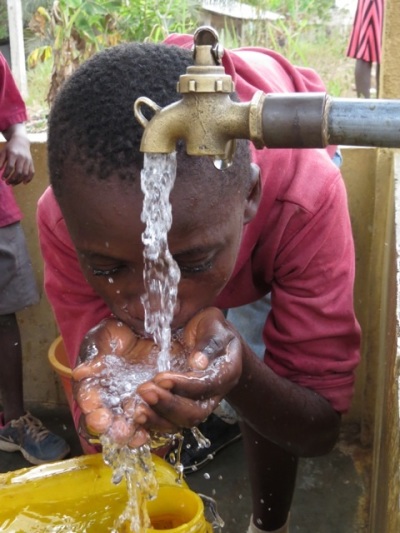Clean Water Means Time, Education and Hope for Young Girls

In 2007, I was in a remote village in the Southern Province of Zambia and witnessed an incredible event – the arrival of the community's first water well. I remember watching the World Hope International drilling rig dig through the hard, dry soil. I was standing alongside hundreds of villagers and their local pastor and felt overjoyed when water finally began to gush out.
I praised God that the village would now have access to clean water for the first time and that young girls in the village would no longer have to walk five miles each day to fetch it for their community.
I expected the villagers to have the same reaction. However, much to my surprise, the initial response I saw was hesitation. I looked at the pastor and noticed that he had tears streaming down his face. This was uncharacteristic for his culture, as men tend to not cry in front of people. He seemed to be struggling to get words out and then finally exclaimed with enthusiasm:
"Today is resurrection day. God has heard our cry!"
Unable to stop the tears from streaming down his face, the pastor recognized that this was a new beginning—even his own daughter's future had been altered. Young girls danced with joy, celebrating that this water would do more than quench their thirst or wash their clothes; it would offer new access to an education.
This story isn't uncommon. The truth is that many young girls in underdeveloped communities around the world spend many hours each day walking to get water. In fact, the average time spent fetching water is six to eight hours every day. Globally, women and girls collectively spend about 200 million hours per day gathering water [source: UNICEF].
Plus, on the long and dangerous journey to fetch water, girls have increased exposure to trafficking and sexual violence, while the boys and men in their community can go to school and work in crops closer to home.
We know girls are not expendable and are made in the image of God. What deeper meaning does clean, close water have for girls, who often bear the water chore responsibility of the family?
I've seen how access to water that's closer to home opens a whole new world for young girls. Girls can arrive to school on time and stay for the whole day, allowing them to focus fully on their studies alongside their peers. Additionally, according to the World Bank, better educated women tend to be healthier, participate more in the formal labor market, earn higher incomes, have fewer children, marry at a later age, and enable better health care and education for their children, should they choose to become mothers. All these factors combined can help lift households, communities, and nations out of poverty.
I've heard first-hand stories of women whose lives were altered because of access to clean water. These women who go on to college later return to their communities and are able to share messages of hope to the next generation of young girls.
The Apostle John said, "Out of believer's heart will flow rivers of living water." Throughout the Bible, water is referenced as the source of life—spiritually and physically. Access to clean water affects girls holistically—their health, safety, education, and ability to take charge of their futures. At large, this Zambia community has been completely transformed. Irrigation systems from that well support sustainable crops and bring better health from the vegetation. The surplus of crops grown could be sold and build a self-sustaining economic system. The multiplying effect of investing in clean water is undeniable.
While we often take literal water for granted here in the U.S., we must remember the global need and how clean water access can change the lives of so many young girls in underdeveloped communities across the world. Countryside Church from Spearfish, South Dakota generously supported the construction and drilling of the well in Zambia. Connecting to and giving to this community from thousands of miles away not only changed the future of the young girls there and the village's economic system, it also reinvigorated a sense of purpose in this congregation to care for others.
As Christians, let us be like Countryside Church and remember that we are called upon to be ambassadors of love for our neighbors, no matter how far away, and to make the world a better place. Things don't need to remain as they are; we need to bring about things as they should be.
Dr. Jo Anne Lyon is the General Superintendent Emerita, Wesleyan Church and the founder of World Hope International, a US-based Christian relief and development organization. From now until December 31, World Hope International is running a 1:1 Water Match Challenge where four generous donors will match dollar-for-dollar if $500,000 is raised. This means that $1 million dollars can be raised to provide clean water access for communities across Liberia, Sierra Leone, Haiti and Cambodia—reaching nearly 120,000 people!





















